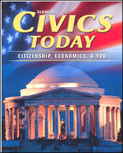
Civics Today Citizenship, Economics, & YouChapter 11: Influencing GovernmentChapter OverviewsPublic opinion includes the ideas and attitudes that most people hold about elected officials, candidates, government, and political issues. Public opinion can help elected officials make decisions. On any given issue, different groups of the public often hold different viewpoints. Their backgrounds and life experiences, as well as age, gender, income, race, religion, occupation, and place of residence, affect people's opinions. Public opinion is measured by looking at election results and public opinion polls. People who share a point of view about an issue may form what is called an interest group. These groups work at influencing public opinion. Some interest groups are based on economic interests, while others promote an ethnic group, age group, or gender. Interest groups use lobbyists to help them influence government officials. In order to influence the public, interest groups may use direct-mail campaigns or advertisements on television and radio. Some of the propaganda techniques they use are endorsements, stacked cards, bandwagon, glittering generalities, symbols, just plain folks, and name-calling. The public is often affected by the mass media. Television, radio, newspapers, magazines, recordings, movies, and books are called the mass media because they communicate broadly to masses of people. Because of the modern media, some people are able to successfully run for office who might never have done so before. Elected officials want the media to portray them as effective leaders. They rely on their press secretaries to hold news conferences, give interviews, and stage media events. The mass media also play an important "watchdog" role over government activities. |  |















